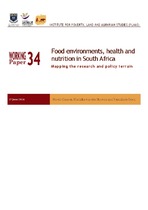| dc.contributor.author | Claasen, Nicole | |
| dc.contributor.author | van der Hoeven, Marinka | |
| dc.contributor.author | Covic, Namukolo | |
| dc.date.accessioned | 2019-03-14T11:00:21Z | |
| dc.date.available | 2019-03-14T11:00:21Z | |
| dc.date.issued | 2016-06 | |
| dc.identifier.citation | Claasen, N., van der Hoeven, M., and Covic, N 2016. Food environments, health and nutrition in South Africa, Working Paper 34. Cape Town: PLAAS, UWC and Centre of Excellence on Food Security. | en_US |
| dc.identifier.uri | http://hdl.handle.net/10566/4520 | |
| dc.description.abstract | The aim of this paper was to review existing research and policies related to food environments so as to
identify research gaps towards a research agenda for the new Centre of Excellence in Food Security.
Food environments influence food choices and nutritional status. Significant changes have taken place in
the South African consumer food environments since the mid-1990s accompanied by increased
consumption of processed and fast foods. Overweight, obesity and non-communicable diseases (NCDs)
have increased while micronutrient deficiencies remain highly prevalent. This raises concerns regarding
the impact of current food environments on health and nutrition. A review was conducted identifying
existing conceptual frameworks for food environments, as well as South African research and policy
documents, all addressing the association between environmental factors and eating behaviour/food
choices amid increasing obesity and NCDs rates. South African research does not address food
environments comprehensively, tending to focus on aspects such as the situation in home, school,
community and retail settings. The associations between food environments, the role of the food industry,
the food choices and behaviour of consumers remain under-researched. Nutrition research focuses on
nutrient intakes without interrogating foods being consumed. While a progressive policy environment
exists it remains largely unevaluated and the high prevalence of obesity, related NCDs and micronutrient
deficiencies question its effectiveness. There is a need to conduct comprehensive food environment
research that can inform policies and programmes to effectively address the high prevalence of over and
undernutrition. | en_US |
| dc.language.iso | en | en_US |
| dc.publisher | Institute for Poverty, Land and Agrarian Studies, University of the Western Cape | en_US |
| dc.relation.ispartofseries | Working Paper;34 | |
| dc.subject | Food environments | en_US |
| dc.subject | Health | en_US |
| dc.subject | Nutrition | en_US |
| dc.subject | Policy | en_US |
| dc.title | Food environments, health and nutrition in South Africa: Mapping the research and policy terrain | en_US |
| dc.type | Working Paper | en_US |

